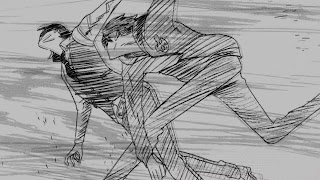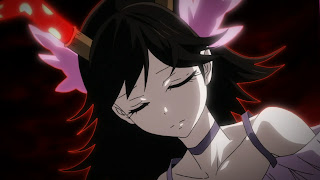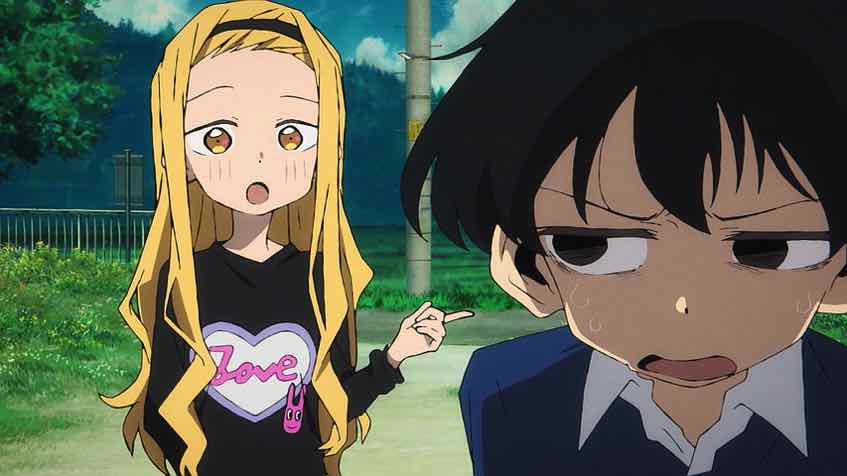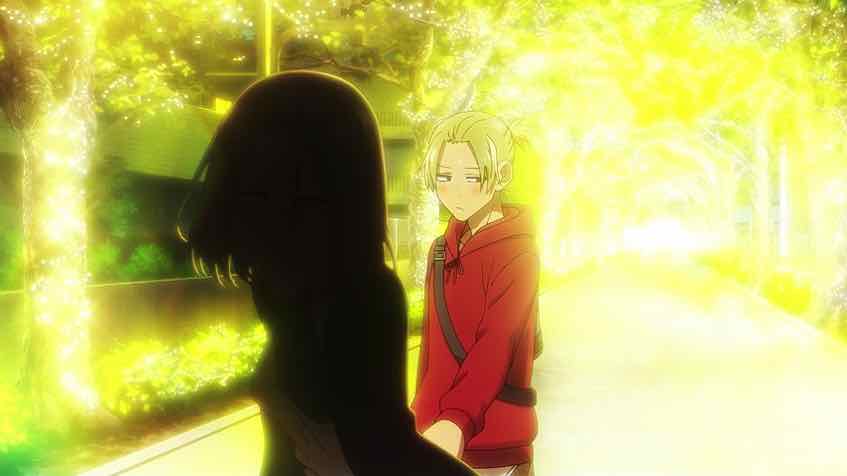To my perception, C has pretty much been lost and foundering for a while now. So it really didn’t come as a great surprise or disappointment that the finale had a sort of spent quality to it, as if the opportunity for a real dramatic payoff was already gone, but the effort had to be made anyway.
We all know the 11-episode format is a tough one, and there’s been an improvisational feel to the last several episodes. I think Kenji Nakamura had a big idea that he wanted to express, but the details have proved to be problematic. At the very least we seemed to have an interesting conundrum as the finale started: how can there be a present without a future, and what good is a future without a present? Both Kimimaro’s and Mikuni’s ways seemed to be in error.
 |
| Cost Effective |
Unfortunately, the resolution seems to gave pretty much been a cop out, though I’ll freely admit the last couple of eps were confusing enough that I can’t be sure. Apparently, by totally devaluing the yen, Kimimaro’s plan managed to make the C wave pass over Japan unscathed – thus freeing him to use his darkness card to reverse the rotary press and buy back the future. Huh? That seems remarkably convenient to me, but I suppose there was no other way out of the box the show had written itself into. What’s left is a Japan that uses the dollar, where Hanabi is a teacher who apparently doesn’t know Kimimaro, and the professor has his wife and kids back. Easy, peasy.
Inside the FiDi, of course, things are crashing down all around as the collapse of the yen means the end for the Japanese FiDi. The conclusive battle between Kimimaro and Mikuni was fairly dramatic, though the switch to pencil sketches was a transparent budget saver that added nothing creatively. Obviously Kimimaro was going to win, and he did – but Mashu was still just as doomed as Q. That’s a shame, as she (and Haruka Tomatsu) was the best thing about this series. As Q removed all doubts by actually turning into Mikuni’s sister Takako, Mashu got busy and made sure she didn’t die a kiss virgin, giving Kimimaro a big one on the lips before she too disappeared. We never did find out just what or who represented from Kimimaro’s future, but it was said to see her go.
 I like most of the characters here and I really wanted to feel connected as the series closed, but things were so chaotic and rushed that it was hard to care all that much. If I’m not mistaken Satou is alive after all, though that doesn’t seem to make much sense after last week. Masakaki appears to Kimimaro on his park bench and implies that the FiDi will return at some point in the future. Mikuni says he’s “staying in today forever”. And what becomes of Kimimaro? Well, I guess it’s hard to say. Mashu is gone (was she his future daughter?), Hanabi seems not to know him in this world, and presumably he’s just a poor college student again.
I like most of the characters here and I really wanted to feel connected as the series closed, but things were so chaotic and rushed that it was hard to care all that much. If I’m not mistaken Satou is alive after all, though that doesn’t seem to make much sense after last week. Masakaki appears to Kimimaro on his park bench and implies that the FiDi will return at some point in the future. Mikuni says he’s “staying in today forever”. And what becomes of Kimimaro? Well, I guess it’s hard to say. Mashu is gone (was she his future daughter?), Hanabi seems not to know him in this world, and presumably he’s just a poor college student again.
And that’s that – not with a bang but a whimper. So much of that was random – the insert song was supposed to be poignant, I suppose, but it was sort of a discordant not in the episode. It’s too bad, but for me this finale didn’t really make much of an impact either emotionally or intellectually. It’s possible I’m just burned-out after the intensity of AnoHana’s final episode, and there’s no denying this one pales by comparison. But even the interesting philosophical and economic musings the series sometime used successfully were fairly punchless in the last episode. A good try, but for me this was a forgettable end to a forgettable series.





draggle
June 25, 2011 at 12:54 am"Satou is alive after all, though that doesn't seem to make much sense after last week."
Did you notice that Kimimaro got his legs chopped off in the battle with Souichiro this episode? After thirty seconds or so they were just back somehow, I had to rewind to make sure I wasn't imagining things. As I believe you mentioned last week, logic and consistency have never been this show's strong points. :/
admin
June 25, 2011 at 3:09 amSadly, yes – this is true. I almost get the sense that something changed in the middle of production and everything slipped after that.